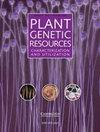埃塞俄比亚南部阿瓦达地区阿马罗咖啡(Coffea arabica L.)的多变量表型分析
IF 0.7
4区 生物学
Q3 PLANT SCIENCES
Plant Genetic Resources: Characterization and Utilization
Pub Date : 2022-05-17
DOI:10.1017/s1479262122000119
引用次数: 0
摘要
作为咖啡的原产地,埃塞俄比亚在其多样化的咖啡种植农业生态中被赋予了巨大的作物多样性。Amaro Kelo是埃塞俄比亚主要的咖啡生产农业生态之一,其地方咖啡种质资源的遗传多样性以前没有得到适当的描述。该研究旨在对64个Amaro Kelo当地咖啡品种进行特征描述,以了解在未来咖啡遗传改良工作中利用这些品种的潜力。实验采用8 × 8简单格子设计,在阿瓦达农业研究分中心进行2次重复。收集了19个定量性状和10个定性性状的数据,并进行了多变量分析,即聚类和主成分分析。聚类分析根据数量性状鉴定出5个聚类,大多数聚类之间的距离极显著(P < 0.01)。主成分分析表明,特征值大于1的前6个主成分占总变异量的77.7%。前两个主成分对总变异的贡献率分别为23.32%和18.85%,累计贡献率为42.2%。此外,分枝习性、生长习性、果实形态、整体外观和茎习性等品质性状的香农多样性指数均较高。总体而言,多变量分析证实了所研究的Amaro-Kelo咖啡品种之间存在较高的变异,这可能为未来咖啡遗传改良或保护工作提供重要的遗传资源。本文章由计算机程序翻译,如有差异,请以英文原文为准。
Phenotypic characterization of Amaro coffee (Coffea arabica L.) local accessions using multi-variate techniques at Awada, Southern Ethiopia
As a country of origin of coffee, Ethiopia is endowed with an immense diversity of the crop in its diverse coffee-growing agro-ecologies. Amaro Kelo is one of the major coffee production agro-ecologies in Ethiopia, where the genetic diversity of its landrace coffee germplasm was not properly characterized previously. The study aimed to characterize 64 Amaro Kelo local coffee accessions to understand the potential of the accessions for utilization in future coffee genetic improvement efforts. The experiment was laid out in an 8 × 8 simple lattice design with two replications at Awada Agricultural Research Sub-Center. Data were collected on 19 quantitative and 10 qualitative traits, and subjected to multivariate analyses, i.e. cluster and principal component analyses. The cluster analysis identified five clusters based on the quantitative characters, and the distances between most of the clusters were highly significant at P < 0.01. Principal component analysis revealed the first six principal components with Eigenvalues greater than one accounted for 77.7% of the total variation. The first two principal components with respective contributions of 23.32 and 18.85% cumulatively accounted for 42.2% of the total variation in the accessions. In addition, high values of Shannon-diversity index were found for the qualitative traits: branching habit, growth habit, fruit shape, overall appearance and stem habit. In general, the multivariate analyses confirmed the presence of high variation among the studied Amaro-Kelo coffee accessions that might serve as an important genetic resource for future coffee genetic improvement or conservation efforts.
求助全文
通过发布文献求助,成功后即可免费获取论文全文。
去求助
来源期刊

Plant Genetic Resources: Characterization and Utilization
Agricultural and Biological Sciences-Agronomy and Crop Science
CiteScore
2.80
自引率
0.00%
发文量
29
审稿时长
>12 weeks
期刊介绍:
Plant Genetic Resources is an international journal which provides a forum for describing the application of novel genomic technologies, as well as their integration with established techniques, towards the understanding of the genetic variation captured in both in situ and ex situ collections of crop and non-crop plants; and for the airing of wider issues relevant to plant germplasm conservation and utilisation. We particularly welcome multi-disciplinary approaches that incorporate both a technical and a socio-economic focus. Technical aspects can cover developments in technologies of potential or demonstrated relevance to the analysis of variation and diversity at the phenotypic and genotypic levels.
 求助内容:
求助内容: 应助结果提醒方式:
应助结果提醒方式:


